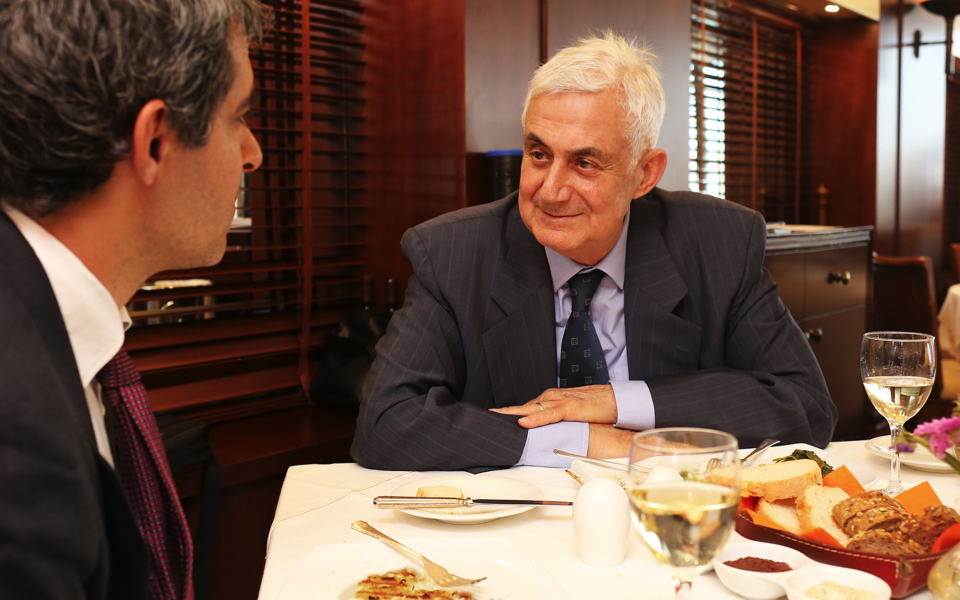The agora of the shipping world

“The business of publications and conferences is basically the same thing: bringing people together, like an ancient agora,” says Themistocles Vokos, one of the main forces behind the biennial Posidonia exhibition that opens on Monday at the Athens Metropolitan Expo center.
From a time when captains and shipowners knew the price of a sack of lentils, to the age of IPOs, big data and smart ships, Posidonia has grown into a major event in the global shipping calendar. As Vokos proudly notes, it is an exhibition that serves as a forum of communication between foreign delegations, regardless of their interest in doing business with Greeks.
How did it all start? “In 1957 my father started a newspaper on shipping called Naftiliaki-Naftergatiki, and in 1964 he and then shipping minister Stavros Biris, a close friend, decided to launch a conference that would showcase Greek shipping and its importance to the economy.”
The conference opened at the Hilton hotel in the presence of the newly crowned king, Constantine, and Prime Minister Georgios Papandreou. Stratis Andreadis headed the Union of Greek Shipowners. “There were two groups in the shipping family at the time,” says Vokos. “One argued that ‘we don’t need a festival – better that we’re unknown.’ The other, spearheaded by Yiannis Carras, a great man, was in favor of the sector’s promotion.”
In London
Vokos was 25 years old when all this was going on and his role was handing out information satchels to delegates. He had returned to Athens briefly from London, where he worked as a journalist and helped his father’s publishing business. The colonels’ coup in Greece in 1967 led to an extension of his stay in the UK, where he became more deeply involved in publishing and also in conferences.
In 1970, he launched Seatrade, a pioneer in shipping literature. “All of the magazines until then were published by former seamen and had ship engines on the cover. We wrote about political and economic developments, about businesses and about developments in the banking sector. Our covers were of current affairs,” says Vokos.
Besides London, the magazine went on to open offices in Hong Kong and New York, establishing Vokos as a major force in maritime publishing.
He organized an international shipping conference in London in 1973 and another in Hong Kong the following year. “They were a success thanks to the magazine,” he says. “Within just a few years, Seatrade had become The Economist of shipping.”
In the meantime, the first Posidonia was held in Athens in 1969 as a result of that first conference at the Hilton, and Vokos was responsible for attracting foreign firms to the exhibition.
The death of his father in 1974 was a turning point. “I took on the role of caretaker, with the same team that had worked for us for years but also with new goals,” Vokos says.
Among the many decisions he was required to make, he turned down a number of requests – such as from Dubai – to host the exhibition in other countries. “Posidonia is unique and it is associated with Greece. I wouldn’t want that to change,” he says.
The element of family, such an important component in the success of so many Greek shipping firms, is still evident at Posidonia, and Vokos’s nephew, Theodore, is currently executive director of the company that organizes the show.
“Family continuity is important,” he says, even though his own children have followed different career paths. “I encourage my 11 grandchildren to go their own way too. I don’t believe that just because I started something, they need to follow suit.”
How do younger shipowners compare with their counterparts of 50 years ago? “The young generations don’t have the ‘salt,’ the experience of the actual ship that the old captains had. It is important to know the details, to know how a ship can be more productive,” Vokos says. “The Greek network of support and information exchange, but also the family business culture, have remained largely the same. These should not be lost because they define Greek shipping.”
“It is truly remarkable how well this country has done in this field,” continues Vokos. “The big powers in shipping were usually the leaders of international commerce. Britain had a fleet because it had colonies. Of the Greek fleet, however, just 1 or 2 percent comes to Greece to pick up or deliver cargo.”
The China gamble
Themistocles Vokos found himself in China in 1979 during the trial of the Gang of Four and as the country was trying to recover from the chaos of the Cultural Revolution.
“I wanted to create a business that somebody would want to buy, so I thought of establishing myself in the tough markets that multinationals were scared of,” he says. “That way, when the big guys came I would already be there waiting for them.”
After several exploratory trips to countries including Brazil and Vietnam, he went to China, where he started a series of publications on shipping and other subjects, in English and Chinese.
It proved something of an endeavor. “Communication by telephone was not easy in the early years and the ministries didn’t have fax machines. So we’d leave Hong Kong with a bag full of faxes and our Chinese associates would meet us at the custom’s office so they could take them,” Vokos remembers.
Another problem was that few Chinese officials spoke English. “We told them to pick a few people we could send, at our expense, to Britain for a six-month crash course in the language.”
Vokos’s gamble in China paid off when the country broke out as a global economic force and he was able to sell his Hong Kong-based company to a large multinational. As he explains the success of his endeavor there, he recounts an incident during one of his earliest visits to China. He was in an elevator with a British man who was speaking rapid idiomatic English to his Chinese host. “I finally told him: ‘I’m sorry but your Chinese friend has not understood a single word you said.’ Many [Westerners] who went to these developing markets failed to recognize the need to understand the locals and think like them,” Vokos says.
“My philosophy is that I’m not doing this job as a platform for something else, like becoming a broker for example. I also go wherever it takes me. Wherever I land, I will find a way to adjust,” he adds.
This ability to adjust has served him well throughout his life. His father – who was born in Cairo and worked as a journalist in Athens before World War II, then went on to serve as editor in chief of the centrist newspaper Proodeftiki Allagi (Progressive Change) in the early 1950s – had sent Themistocles to England at the age of 13 so he could learn the language fluently. By the age of 14, he was working as an intern at an advertising firm in London. Vokos has spent the last 50 years living outside Greece.
I ask him about the hundreds of thousands of Greeks, most university graduates, who have left the country in the past few years.
“China’s growth from the 1980s onward is directly linked to the return of the Chinese diaspora – from California, Australia and even Taiwan,” Vokos notes. “But you need to provide the conditions to convince someone to pick up and come back. Meritocracy counts above all else and, unfortunately, from what I hear, this is still regarded as a problem [in Greece] today.”





